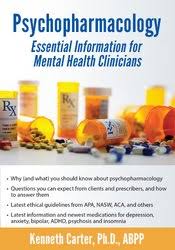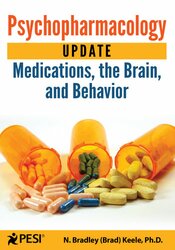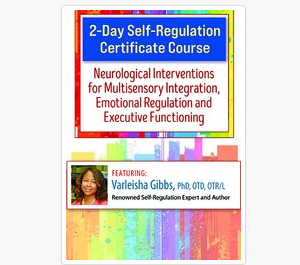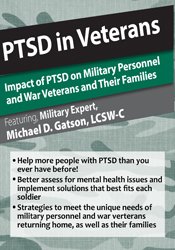Kenneth Carter – Psychopharmacology, Essential Information for Mental Health Professionals
$200.00 Original price was: $200.00.$75.05Current price is: $75.05.
Dr. Carter answers questions from providers in the field and walks through examples of practical clinical discussions that come up every day in practice, including how to discuss scope of practice with your patients in order to optimize their care when working with multiple providers.
Kenneth Carter – Psychopharmacology, Essential Information for Mental Health Professionals
Dr. Kenneth Carter, a board certified Clinical Psychologist with a Master’s degree in Clinical Psychopharmacology, shares his clinical experience and training to provide detailed information about the range of common medications prescribed for mental health conditions. You will get the latest information on antidepressants, anxiolytics, and common medications for insomnia and Attention Deficit/Hyperactivity Disorder among others. Through lecture, the examination of multi-disciplinary ethics codes and real case examples, you will take a close look at the ethical decisions that accompany medication use and the non-prescriber’s role and limits with regards to medication discussions with your patients.
Dr. Carter answers questions from providers in the field and walks through examples of practical clinical discussions that come up every day in practice, including how to discuss scope of practice with your patients in order to optimize their care when working with multiple providers. The goal is for you to leave better prepared to communicate with your clients as well as the prescribers, as Dr. Carter instructs you on how the medications work, their benefits, and the side effects and dangerous reactions associated with them.
- Discuss the proper role of mental health professionals who treat clients receiving both psychotherapeutic medications and psychotherapy.
- Explore specific ethical issues and resolutions related to communicating with clients and prescribing professionals about psychotropic medications.
- Explain the neurotransmitter systems and neuroanatomy underlying the biological basis for mental disorders and pharmacotherapy.
- Identify the major classes of drugs used to treat mental disorders and which mental disorders are appropriately treated with each class of drugs.
- Describe adverse effects and drug reactions of the commonly prescribed psychotropic medications and when to alert the prescriber about them.
- Analyze the role that half-life plays in the efficacy of insomnia medications prescribed for clients and how it may affect behavioral interventions.
Would you like to receive Kenneth Carter – Psychopharmacology, Essential Information for Mental Health Professionals ?
MEDS 101
- Case study
- Reasons to be knowledgeable about psychiatric medications
- Lessons from other disciplines
- Pharmacy
- Nursing
- Ethics guidelines
- The common questions clients have about their medications
- Handling differences of opinion between yourself and a prescribing professional
General Overview of the Nervous System
- Organization of the nervous system
- Structure of the neuron
- Communication between neurons
- How medicines interact with the nervous system
Depression Medications
- Neurobiology
- SSRIs and SNRIs
- Mechanism of action
- Benefits and adverse reactions
- Medications in these categories
- Case study
Anxiety Disorder Medications
- DSM-5® anxiety categories
- Deconstructionist approach taken by prescribers
- Neurobiology
- SSRIs and Benzodiazepines
- Mechanism of action
- Benefits and adverse reactions
- Medications in these categories
- Case study
Bipolar Medications
- Monotherapy
- Lithium, Anticonvulsants, and 2nd generation antipsychotics
- Mechanism of action
- Benefits and adverse reactions
- Medications in these categories
- Case study
ADHD Medications
- Neurobiology
- Methylphenidate and Amphetamine
- Mechanism of action
- Delivery systems
- Benefits and adverse reactions
- Medications in these categories
- Case study
Antipsychotic Medications
- Psychosis symptoms
- Neurobiology
- 1st and 2nd generation
- Antipsychotics
- Mechanism of action
- Benefits and adverse reactions
- Medications in these categories
- Case study
Insomnia Medications
- Causes and treatments for insomnia
- Medications for insomnia
- Half-life
- Benefits and adverse reactions
- Case study
Limitations of the Research & Potential Risk
Course Features
-
Lectures
0 -
Quizzes
0 -
Duration
Lifetime access -
Skill level
All levels -
Language
English -
Students
0 -
Assessments
Yes
Q & A
Ask a question
Your question will be answered by a store representative or other customers.
Thank you for the question!
Your question has been received and will be answered soon. Please do not submit the same question again.
Error
An error occurred when saving your question. Please report it to the website administrator. Additional information:
Add an answer
Thank you for the answer!
Your answer has been received and will be published soon. Please do not submit the same answer again.
Error
An error occurred when saving your answer. Please report it to the website administrator. Additional information:
Related products
Health & Medical
Health & Medical
N. Bradley Keele – Psychopharmacology Update – Medications, the Brain, and Behavior
Health & Medical
Health & Medical
Health & Medical













Reviews
There are no reviews yet